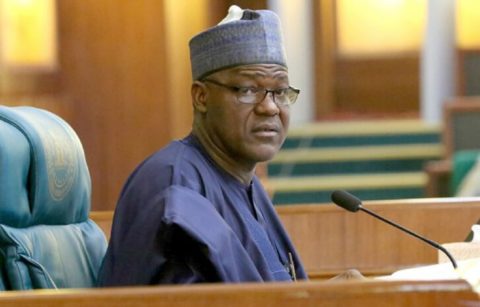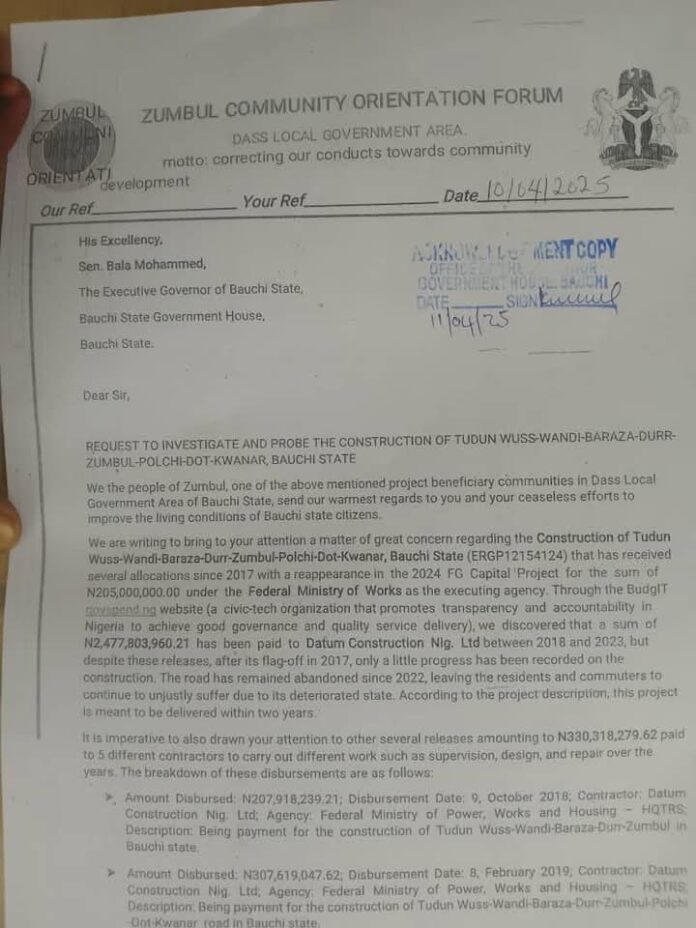Zumbul Community Demands EFCC, ICPC Probe Yakubu Dogara Over Abandoned Tudun Wuss-Wandi-Bazara-Durr Zumbul-Polchi-Dot Kwana Road Project in Bogoro-Dass-Tafawa Balewa Federal Constituency of Bauchi State
By: Joy Musa
The Zumbul Community Orientation Forum has issued a passionate call to Nigeria’s top anti-corruption agencies—the Economic and Financial Crimes Commission (EFCC) and the Independent Corrupt Practices and Other Related Offences Commission (ICPC)—to urgently investigate the abandoned Tudun Wuss-Wandi-Bazara-Durr Zumbul-Polchi-Dot Kwana road project in Bauchi State. Central to their demand is the former Speaker of the House of Representatives, Hon. Yakubu Dogara, under whose tenure the project was allegedly approved and funded.
The road, intended to serve as a critical link between several communities within the Bogoro, Dass, and Tafawa Balewa Federal Constituency, was listed as part of the Federal Government’s Zonal Intervention Projects (ZIPs). Despite public records showing that over two billion naira was released for the construction between 2018 and 2023 through the Federal Ministry of Works, Housing and Power, the project has reportedly not been executed, nor is there any sign of substantial work done on the ground.

A Promised Lifeline That Never Arrived
The failed project has left residents in Zumbul and neighboring towns in deep frustration. The communities, mostly agrarian, depend heavily on this road network for trade, mobility, and access to healthcare.
“This road was supposed to open up our villages, ease our transportation problems, and connect us to economic opportunities,” said Ibrahim Musa, spokesperson for the Zumbul Community Orientation Forum. “But what we got instead is abandonment, silence, and the painful realization that our voices may have been ignored. This is why we are demanding a full-scale probe.”
A Trail of Funds, But No Road
Documents obtained through public budget records and whistleblowers indicate that the project was allocated in successive budgets from 2018 to 2023 under the ZIP scheme. The contract for the road was reportedly awarded to Datun Construction Limited and supervised by the Federal Ministry of Works.
However, independent site inspections and testimonies from residents reveal that the road project remains largely untouched. “No single kilometer of the road has been constructed, and the terrain remains as treacherous as ever,” said Musa.
This glaring disparity between budgetary releases and the reality on the ground has triggered suspicions of massive misappropriation, prompting the community to formally petition the EFCC and ICPC to investigate all parties involved—including Hon. Dogara, the contractor, and the supervising ministry.
Hon. Yakubu Dogara Under Scrutiny
As the federal lawmaker representing the constituency during the period in question, Hon. Yakubu Dogara is alleged to have facilitated the project through the National Assembly and assured constituents of its execution.
“He personally assured us during a town hall meeting that the road was approved and funded. That was years ago. Now, we’re left in the dark,” said Aminu Galadima, a youth leader in the Bazara community.
While no official charges have been made, the community is urging anti-graft agencies to summon the former Speaker to account for his role in the facilitation and monitoring of the project.
Community Calls for Justice
In their formal petition, the Zumbul Community Orientation Forum has outlined specific demands:
1. A forensic audit of all funds released for the project between 2018 and 2023 by the Office of the Auditor-General of the Federation.
2. An investigation into Datun Construction Limited to establish the status of the contract, any work claimed to have been done, and fund utilization.
3. A public hearing involving representatives from the Ministry of Works, the contractor, and Hon. Yakubu Dogara.
4. Reforms mandating independent monitoring and verification for all zonal intervention projects.
The Forum insists their demand is not politically motivated but born out of a collective desire to see accountability in public service. “We are simply asking the relevant agencies to do their job—follow the money and tell the people the truth,” said Musa.
Legal Experts Weigh In
Legal analysts have weighed in on the implications of the case, calling it a litmus test for Nigeria’s anti-corruption framework.
“If indeed funds were released and no work was executed, then this is a clear-cut case of economic sabotage,” said Barrister Hafsat Yakubu, a legal and governance expert. “Constituency projects should benefit the people, not serve as conduits for looting. A proper investigation could set a much-needed precedent.”
She emphasized that such cases offer an opportunity for anti-corruption agencies to rebuild public trust by showing that no one—regardless of political position—is above accountability.
A Cry for Help, Not Just a Protest
To the people of Zumbul, the fight is not just about a road—it is about justice, representation, and the right to benefit from national resources. The abandonment of the project has also affected school attendance, emergency response, and food transportation in the region.
“The dry season makes the journey dusty and unbearable; the rainy season cuts us off entirely,” said local farmer Abdullahi Garba. “We are tired of empty promises and ghost projects. We want the truth, and we want that road.”
The Bigger Picture:
The Zumbul road saga is not an isolated case. Across Nigeria, many rural communities have similar tales of unexecuted constituency projects. Analysts argue that only a nationwide auditing system and prosecution of defaulters can stop this dangerous trend.
For now, all eyes are on the EFCC and ICPC to rise to the occasion.
However, The Zumbul Community’s demand for an investigation into the Tudun Wuss-Wandi-Bazara-Durr Zumbul-Polchi-Dot Kwana road project is a wake-up call. It is a plea for transparency, justice, and a renewed social contract between government and citizens. With over two billion naira reportedly spent and no road in sight, accountability is not just necessary—it is overdue.
If the voices of the rural poor continue to be ignored, then the idea of inclusive development remains a mirage. But if this case is properly investigated and justice served, it could mark the beginning of real change.







